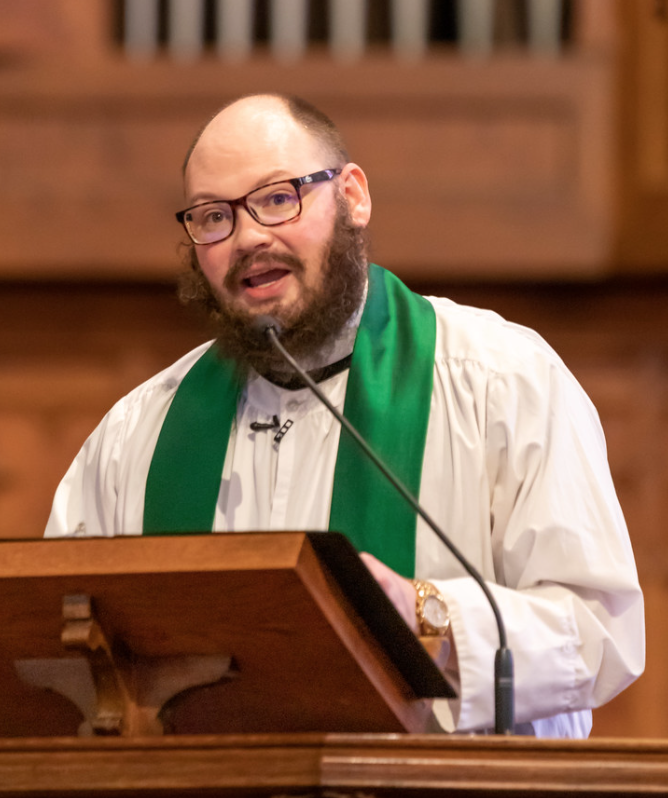
Rev. Richard Hogue Jr.
St. Paul’s Cathedral. San Diego
12/25/2021
Love Reshapes the Cosmos
Merry Christmas! It is wonderful to celebrate with you all this morning. Whenever I think about this passage from John two things stick out to me: first, the light and life part, and how long it’s been since I last considered getting the first lines of John’s gospel tattooed on my arm in Greek. “Ἐν ἀρχῇ ἦν ὁ λόγος , καὶ ὁ λόγος ἦν πρὸς τὸν θεόν , καὶ θεὸς ἦν ὁ λόγος”. The Greek both looks and sounds beautiful, I think. I love the clear mirroring of the book of Genesis in John’s opening to the gospel. To quote Genesis chapter one directly:
“In the beginning when God created the heavens and the earth, the earth was a formless void and darkness covered the face of the deep, while a wind from God swept over the face of the waters. Then God said, ‘Let there be light’; and there was light. And God saw that the light was good; and God separated the light from the darkness. God called the light Day, and the darkness he called Night. And there was evening and there was morning, the first day.”
John in turn is drawing directly upon Jesus’ Jewish tradition, as the writer begins to weave a universe around the person of Jesus, his deeds and teachings, with purpose, light, life, and love. And John’s aim is obviously cosmic in scale, given the source material. It is deeply particular in the human sense, being about the person Jesus, but ultimately in John’s gospel, and the other three, the scale goes from the personal to the universal.
We often emphasize the triumphant Christ, as the institution of the church. We often manifest Christmas as the beginning of eventual triumph. Yet, the root of Jesus’s story as the Messiah, the Christ, is built entirely on a life that would be considered an utter defeat and waste compared to the lives of those recognized as most powerful throughout history. A child, born homeless to an unwed mother in a backwater town, will go on to live life as an itinerant rabbi and die powerless at the hands of the state. Jesus grows up as a member of a militarily occupied people. The structures of empires and colonial extraction were present from the day he was born, and his life was deeply shaped by them. And yet, the very symbol of dominant power the Romans had, the crucifix, will become this child’s symbol, later.
How else can we explain the importance of that kind of life other than as a pure act of God? And what else could we do but celebrate that pure act of God, of lifting up the lowliest to the highest? Christ will upend the course of history, but we may overlook the tender realities of the life of that person if we fast forward too quickly. God becomes the same stuff as us, experiences the same joys and desolations in life, endures the awkward and anxious, and passes through the mundane. He lives a full life and dies a full death. It is the humility and fierce compassion of Jesus that illuminates a new way for people then and now. This life and light, the substance of the divine and the deeply human, was as raw and hungry and as loving as anyone could be. This is the God we celebrate, a God of total commitment to the human condition, a God of total commitment to living a full life.
But we celebrate Christmas not just because of the first one: we celebrate it still because Christ is born anew in the world constantly. The light and life Jesus the Christ brought into this world as a humble person is the gift that is given to us still, grace and mercy flowing like a stream from depths of the divine into our very humanity. God blessed the world at the beginning of Creation, and God blesses our life experiences through the life of Jesus. Every tear shed, every pain and weakness, every aching wound is experienced with God present. We are wounded people, and that’s why this gift of light and life of Christ is the Good News. It is good news for the poor and forgotten, the dispossessed and the disenfranchised, the humble and the lowly. It is good news for us so that we can reflect and reconsider our own priorities through the prism of the life of Jesus.
And, most importantly, it is completely out of our control. This is the unquenchable fire that John the Baptizer spoke about. An unquenchable fire of selfless love, poured into a human body. A life and light that is unquenchably loving and compassionate, a human whose personal desire for justice and peace is unquenchable. This is an uncontrollable and unpredictable life and light, and if God lived it as one of us, then any of us have access to those same vivacious qualities. For we must understand, that if Christ came into this world as the lowliest, then even now any of the lowliest may bear the Good News of God to this day. Perhaps last night a child was born in a parking lot, or a prisoner was visited by an angel, and perhaps they too will alter the course of history and shape the universe to hold more love and joy. Ultimately, that is what Christmas is about: The light can come from anywhere, or anyone. It can’t be bottled and bought, it can’t be restricted or confined, it only requires faithfulness in the face of fear. Mary was faithful, Jesus is still faithful, and we can live that light and love for all people, everywhere. A life lived with love can and will change the shape of the universe.
Amen, and Merry Christmas!

